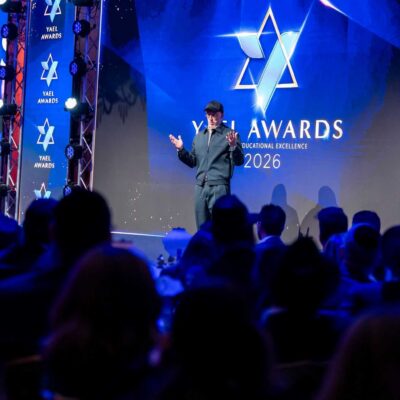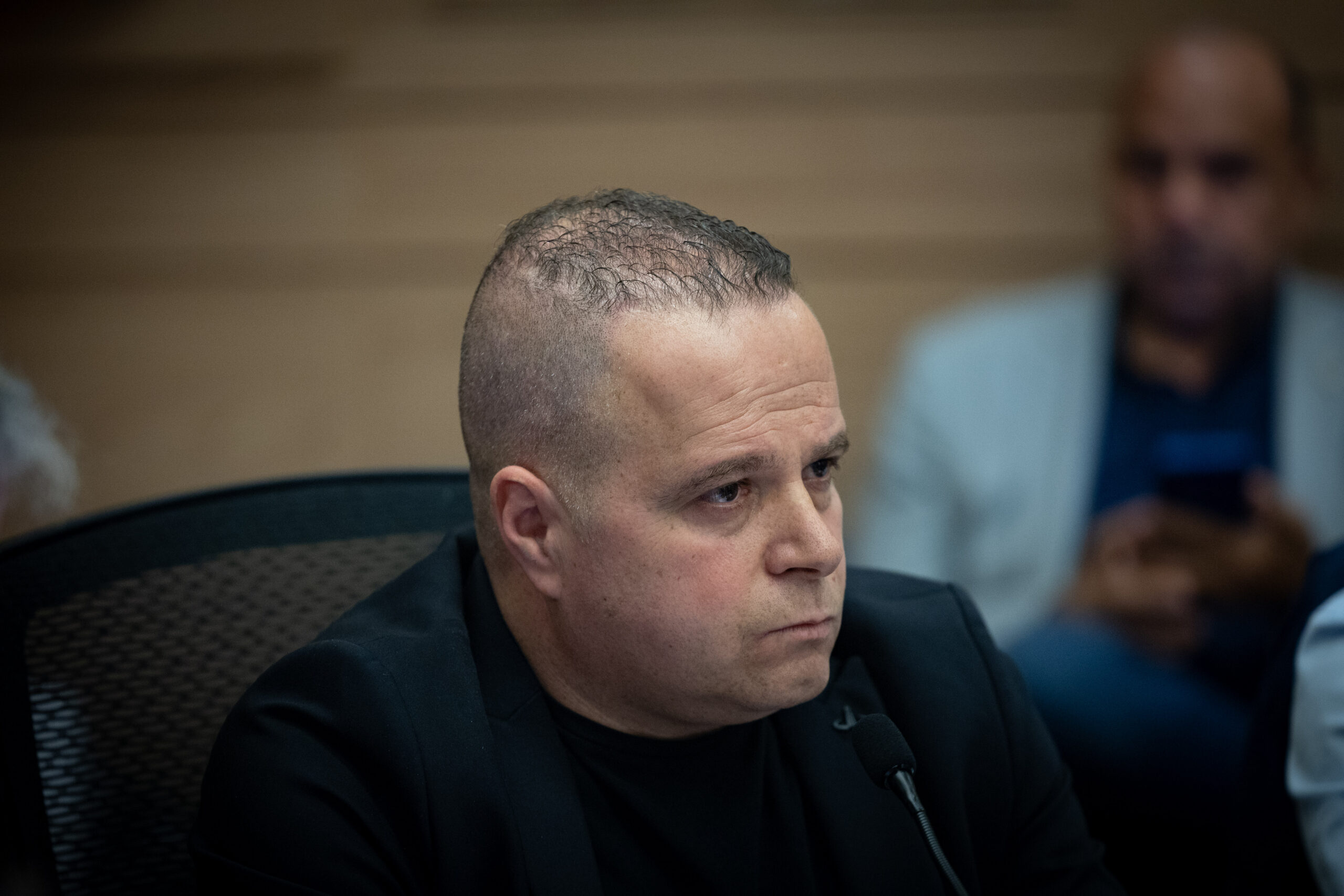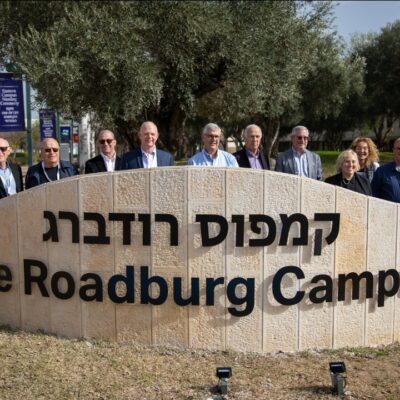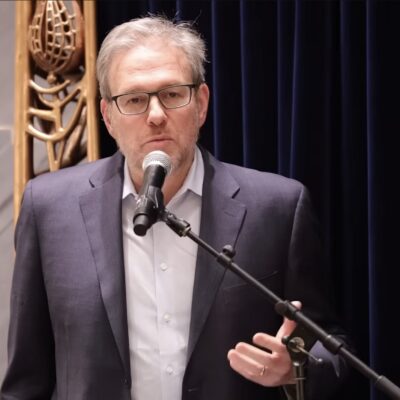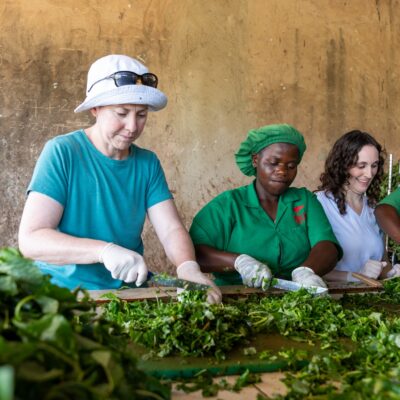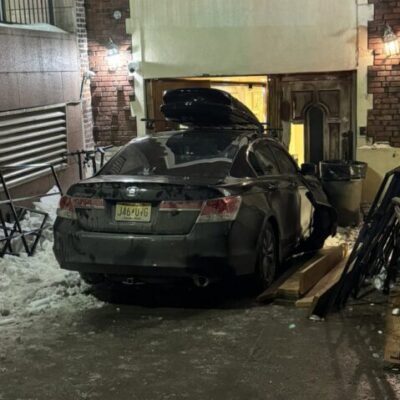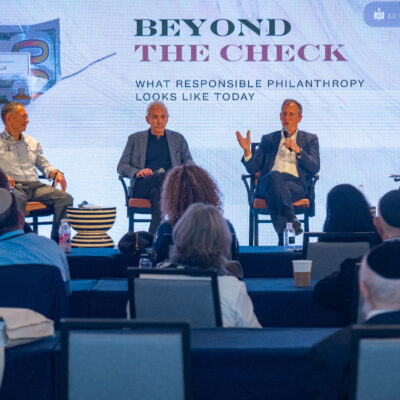Your Daily Phil: Federations’ solidarity mission to Israel + Haredi America’s growth
Good Monday morning!
The Jewish Federations of North America (JFNA) is spearheading a solidarity trip to Israel that departs tonight, JFNA board chair Mark Wilf told eJewishPhilanthropy. Comprised of 22 participants from more than a dozen local federations, the mission includes Ari Ackerman and Marisa Polin, co-chairs of the group’s national young leadership council, and David Brown, national campaign chair. JFNA CEO Eric Fingerhut is already in Israel.
“Following these difficult two weeks, I am proud to be leading this special mission in order to assess the situation on the ground and show our unwavering support for Israel and its people,” Wilf said, noting that the trip is the first JFNA trip to Israel since the start of the pandemic. Participants will need to be fully vaccinated, to take COVID-19 tests before and after their flights and to stay in quarantine until they receive negative results, which will take between 24 and 48 hours.
The trip participants plan to visit an Iron Dome site near Ashkelon and a home hit by a missile in the latest fighting between Israel and Hamas. The delegation will meet with senior government officials, representatives of the IDF and Jewish and Arab activists.
Five Jewish organizations signed a letter to President Joe Biden that expressed grave concerns over a surge in online hatred and antisemitic attacks in the United States and internationally that scapegoat Jews for recent violence in Israel, now halted by a ceasefire with Hamas. Signed by the American Jewish Committee, the Anti-Defamation League, Hadassah: The Women’s Zionist Organization of America, the Jewish Federations of North America and the Union of Orthodox Jewish Congregations of America, the letter calls on Biden to take six actions to fight antisemitism.
Biden should use his bully pulpit to denounce it publicly, and also appoint an ambassador whose job is to monitor and combat antisemitism and reestablish and fill the position of White House Jewish liaison, the letter says. The letter’s writers called on the president to combat antisemitism on college campuses and invest in security for religious institutions.
The United States’ non-Orthodox religious movements — the Union for Reform Judaism, the United Synagogue of Conservative Judaism and Reconstructing Judaism also issued a statement that condemned as antisemitic both the denial of Israel’s right to exist or the holding of Jews accountable for Israel’s actions.
The Jewish Foundation for the Righteous announced on Friday the death of its president, Roman Kent, 92, who survived a ghetto, four concentration camps and a death march and was dedicated to the cause of caring for non-Jews who risked their lives to save Jews during the Holocaust. A businessman who focused on imports from Europe and China, Kent also served as the treasurer of the Conference on Material Claims against Germany and on the United States Holocaust Memorial Museum Council.
the ask
LOOP-ing in customers who want to volunteer, and donate

Courtesy
Elizabeth Faraut is a philanthropist, activist and designer of the LA LOOP, a patented necklace with a loop in its center that can be worn on its own, or as a stylish way to hold a pair of eye or sunglasses. She spoke to eJewishPhilanthropy about her decision to bring her service work and business together by creating a platform, LOOPin, to create volunteer opportunities for her customers.
This interview has been edited and condensed.
Helen Chernikoff: Did you always intend to go into business?
Elizabeth Faraut: It’s funny you ask, because my youngest child is graduating from high school next week and the middle one from college in June. This is what we talk about around the dinner table: “What do you want to be when you grow up?” A lot of that is that as a parent, I share my story, but when I was a child, to be truthful, I didn’t think too much about it. My memories are of my parents and watching them give back. My father was in business, but at his dinner table, we talked more about people who were serving other people and how we as a family could do that.
HC: What kind of service was your family involved in?
EL: When I was 11, we went on a family trip to Israel because my paternal grandfather supported an organization that built tennis centers. The idea was that you could make kids tennis players and enable them to make the world a better place through the sport and through conversation. We flew to Israel for the sole purpose of being part of opening these centers. I remember my parents saying, “This is something Grandpa Bob really believes in.” My parents were involved in our temple. And when it was Thanksgiving, there would be an extra seat for somebody who didn’t have a place to go.
HC: Why did you go into the fashion industry?
EL: Grandpa Bob’s wife, Grandma Dearie, passed away when I was 15. She was six feet tall. When she walked into a room, she just electrified it. I felt that even as a young child. And I lived from age 4 to 11 in France. My grandmother had this incredible grace and beauty, and then I saw it in the French women. That gave me the itch. How does that happen? It’s not about the clothes that you put on your back, or it’s not only about that. It’s about being bien dans sa peau, which means comfortable in one’s skin. That’s what leads to being able to walk into a room and have grace and elegance, and that’s been my North Star, creating products that stand the test of time, that aren’t a fad.
HISTORY LESSON
Inside the new New Orleans museum telling the stories of Southern Jews

Julia Mattis
When Jewish immigrants first arrived in the U.S. from Europe, their first stop was Ellis Island — or at least that’s how the narrative goes. But for many, their first sighting of American shores was Galveston, Tex., a port city that welcomed thousands of Jewish immigrants who would settle across the American South. In cities and towns from Dallas to Vicksburg, Miss., and Charleston, S.C., Jews created community and became part of the fabric of this complicated region. Now, a new museum in New Orleans wants to teach locals and tourists alike the story of America’s Southern Jews, a story that does not always make it into the collective memory of American Jews in big cities like New York or Los Angeles. Jewish Insider’s Gabby Deutch took an exclusive tour of the museum ahead of its opening this week.
Beyond black and white: The Museum of the Southern Jewish Experience (MSJE), which opens on Thursday, had originally planned to open its doors last October but was delayed due to the coronavirus pandemic. Executive director Kenneth Hoffman told JI that the institution aims to fight a common misperception: that people didn’t know there were Jews in the South. The notion mostly comes from “Jews who aren’t from the South,” said Hoffman, who grew up in Baton Rouge, La. “We want to expand people’s understanding of the South,” he explained. “People think of the South in terms of black and white, racially, and that’s understandable. It’s correct. That is the blanket that covers all of Southern history and really all of American history, the racial issues. But they’re not the only stories.”
Read more here.
CHANGING DEMOGRAPHICS
The Future is Haredi

Anna Kristiana Dave / Shutterstock.com
“One of the most significant findings in the recently released Pew study on Jewish Americans in 2020 is that Orthodox- and Haredi-identifying segments of the Jewish population are growing rapidly. Whether philanthropists and professionals working in the communal space are pleased or concerned by this data, the Jewish future in America will be brighter if we all open our eyes to it,” writes Lindsey Bodner in an opinion piece for eJewishPhilanthropy.
The data: “The Pew survey shows that while only 3% of adults over 65 identify as Orthodox, 17% of Jews under age 30 do. Approximately two thirds of Orthodox Jews are Haredi, or ‘ulta-Orthodox’ – meaning Yeshivish and Hasidic, and a shrinking one third are Modern and Centrist Orthodox.”
‘Future Shock’: “Why is all of this so important? Many Jewish umbrella organizations and philanthropists profess their love of the Jewish people and their interest in serving or influencing American Jewry. As time marches forward, to be truly influential in the American Jewish scene these leaders must include more Orthodox Jews in their vision for American Jewry – and its planning and execution.”
TICKING CLOCK
The Pew study and Israel: Seizing the opportunity in the numbers

eJP Archives
“Although the war between Israel and Hamas has been dominating the news headlines, American Jews would be well-served also turning their attention to the Pew Research Center’s new report on Jewish Americans. Its findings contain nothing less than a blueprint for how Israel advocates should focus their attention in the years to come,” writes Dan Elbaum, head of North America at the Jewish Agency for Israel and the president and CEO of Jewish Agency International Development, in an opinion piece for eJewishPhilanthropy.
Good news: “American Jews are revealing something important that is not apparent from a cursory glance at Twitter. Despite all the divisiveness in our public discourse, the majority of us see a commitment to Israel as part of who we are. This is true during quiet times like when the survey was taken and is particularly true when Israel is under attack… However, within this good news, there is a glaring and even existential challenge that American Jews ignore at their peril. Pew found lower levels of attachment to Israel among younger Jewish adults than among older ones.”
Deeper investment needed: “In a very real sense, the Pew numbers reinforce a reality that Israel’s supporters already know. The American Jewish community needs to invest more in the younger generation and find innovative ways for that demographic to connect to Israel.”
Worthy Reads
Squeeze Play: In the Harvard Business Review, Brain Elliott reports that the pandemic has disproportionately increased the stresses and challenges unique to middle management jobs, which are becoming impossible to do well as the workforce grows more horizontally distributed due to remote work and flexible schedules. The solution is to use technology that can perform the management function of “routing” — tracking projects and sharing information — and empower those employees to make more powerful use of the substantive skills they have acquired in their climb up the professional ladder. “Companies need to build career ladders that allow expert individual contributors to grow in title and compensation based on demonstrated expertise and outcomes, without requiring them to become managers.” [HBR]
Continuing Education: A new alliance of eight organizations have created a web portal that gathers and curates information about both climate change and its role in exacerbating health inequities, reports Michael Kravate in Inside Philanthropy. “Investing at the Frontlines of Climate Change” offers an overview of the foundations, nonprofits and government entities working at the intersection of these issues to help funders expert in one cause, such as the health of farmworkers, shore up their knowledge of climate-related phenomena that were new and increasingly urgent — heat exposure, and respiratory problems caused by wildfires. “I think it points to how big this challenge is,” said Jeff Wise, program director of Health and Environmental Funders Network, which led the project. “The problem of climate change and how it’s impacting communities — it requires working outside the comfortable silos that funders are used to working in.” [InsidePhilanthropy]
High Impact: Lauren Booker Allen and Kelsey King of the Omidyar Network confront widespread skepticism about the concept of impact investing in a blog post carried on Medium, citing increasing enthusiasm among both high net worth individuals and large asset managers like TIAA of America as signs that more investors are truly willing to broaden their definition of an acceptable return. Even now, though, barriers such as a lack of education and opportunity stand in the way of aspiring impact investors, Allen and King write, suggesting membership in a peer network such as PYMWYMIC (Put Your Money Where Your Meaning Is Community) as a way to transcend them: “These are unchartered waters, but PYMWYMIC is well-positioned to mobilize significantly more capital towards solving some of the world’s most pressing and urgent challenges.” [Medium]
Hidden Opportunity: AJ Dahyiya, a former monk who now works with a network of grassroots volunteer leaders, shares his vision of the “trust-based values” informed by his spiritual background in a post on PhilanTopic, suggesting that the pandemic has primed philanthropy to be transformed by faith and spirituality. If the philanthropic community can maintain the spirit of more flexible funding practices necessitated by the pandemic, it will see more effective action by the leaders of early-stage organizations like those Dahyiya works with. “One thing COVID-19 has taught us is that philanthropy works better when power is distributed equitably and those closest to the issues have the opportunity to lead,” he concludes. “Crises can be an opportunity to change things that no longer work; let’s not waste this one.” [PhilanTopic]
Community Comms
Apply: Apply for Civic Spirit’s Educators Cohort! Join peers to deepen knowledge and strengthen skills as an educator navigating issues in American society.
Apply! Want to join the team at Jewish Insider/eJewish Philanthropy? We’re looking for a top-notch philanthropy editor. Learn more here.
Be featured: Email us to inform the eJP readership of your upcoming event, job opening, or other communication.
Word on the Street
Ukrainian-born entrepreneur Sir Len Blavatnik and brothers David and Simon Reuben head the latest Sunday Times “Rich List”… Funded in part by a £3 million grant from the U.K.’s National Lottery Heritage Fund, Manchester Jewish Museum will reopen July 2 following a major capital development redesign and expansion… A new exhibition in New York City features artworks by Lily Renée, Bil Spira and Paul Peter Porges, three Jewish artists who fled Vienna during the annexation of Austria by Germany, survived and flourished in the U.S. as commercial artists… The recently launched Asian American Foundation said Thursday it has raised more than $1 billion to support Asian American and Pacific Islander communities… More than 200 businesses — including McDonald’s, Spotify, Levi Strauss, JPMorgan and Pixar — have joined the new Care Economy Business Councilorganized by Time’s Up…
Pic of the Day

Dvir Assoiline
About 2,000 people gathered in lower Manhattan at the site of the World Trade Center yesterday to stand in solidarity with Israel at a rally organized by the Israeli-American Council. Rallies were also held in 14 other American cities.
Birthdays

National Archives at College Park
Born Robert Allen Zimmerman, Hebrew name is Shabsi Zissel, one of the most influential singer-songwriters of his generation, Bob Dylan…
Professor emeritus at Brooklyn College and painter with works in over 70 public art museums, Philip Pearlstein… Co-founder of the law firm Wachtell, Lipton, Rosen & Katz, he is written about in Malcolm Gladwell’s book “Outliers,” Herbert Wachtell… Biographer of religious, business and political figures, including Elizabeth II, the Dalai Lama, Nixon, JFK, Billy Graham and Rabbi Marc Tanenbaum, Deborah Hart Strober… Santa Fe, New Mexico based marketing consultant, Israel Sushman… Member of Congress since 2007 and Tennessee’s first Jewish congressman (D-TN-9), Stephen Ira “Steve” Cohen… Director of planned giving at American Society for Yad Vashem, Robert Christopher Morton… Former Mexican Secretary of Foreign Affairs (2000-2003), he is the author of more than a dozen books, Jorge Castañeda Gutman… First-ever Jewish member of the parliament in Finland, first elected in 1979, in 2011 he was elected as the acting speaker of the Finnish parliament, Ben Zyskowicz… Constitutional historian, lecturer and writer, Richard B. Bernstein… Pulitzer Prize-winning novelist and short story writer, Michael Chabon… Former US Ambassador to Singapore, now a partner in the global law firm Reed Smith, David Adelman… Director of development and alumni relations at Schwarzman Scholars, Debby Goldberg… Senior development director in AIPAC’s northeast region, Nora Berger… Founding partner at Rosemont Seneca Partners and former board president of DC-based nonprofit 826DC, Eric D. Schwerin… Ukrainian businessman, Hennadiy Korban… In 2019 he became the first Israeli winner of an Academy Award in four decades for the Best Live Action Short, Guy Nattiv… Actor Bryan Greenberg… Science writer and the executive director of Science Debate, Sheril Kirshenbaum… Chief of staff at The National September 11 Memorial and Museum, Benjamin E. Milakofsky… Travel blogger, he has visited 194 countries, Drew “Binsky” Goldberg…
Email Editor@eJewishPhilanthropy.com to have your birthday included.


 Add EJP on Google
Add EJP on Google